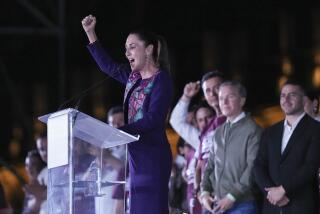Weary of bickering, worried over economy, Spain to vote
- Share via
MADRID — When they voted in national elections four years ago, Spaniards were both traumatized and energized. Their country had just suffered continental Europe’s deadliest terrorist attack, and millions of voters were angry.
A very different and bitterly divided Spain returns to the polls Sunday. Many Spaniards are weary of the endless fighting that has consumed politicians pushing diametrically opposed agendas, and frightened by a once-robust economy’s signs of stumbling.
Tensions on the eve of the parliamentary elections were further inflamed Friday with the assassination of an activist from the ruling Socialist Workers Party in a Basque town, resulting in an early end to the campaign.
Officials blamed the slaying on ETA, the Basque separatist movement. The group, though, did not immediately claim responsibility.
Former city official Isaias Carrasco was gunned down outside his home, as his horrified wife and daughter looked on.
It was not yet clear how the killing would affect the voting. Prime Minister Jose Luis Rodriguez Zapatero and his Socialists need a high turnout to prevail. Rival Mariano Rajoy and the right-wing Popular Party have sought to portray Zapatero as soft on Basque terrorism because he tried to negotiate with ETA at one point, so the attack could send voters to their side. Both candidates condemned the slaying and pledged to defeat ETA, which stands for Euskadi Ta Askatasuna, or Basque Homeland and Freedom, in the Basque language.
Most major opinion polls ahead of Sunday’s vote have given a very slight lead to Zapatero and the Socialists, but the race is too close to call.
Zapatero was elected in 2004 in an upset, after voters rejected the pro-U.S. Popular Party government and blamed it for involving Spain in the war in Iraq, exposing the nation to Islamic terrorism and then lying about the March 11, 2004, attacks in which Islamic militants exploded bombs in Madrid subways during rush hour, killing 191 people. The attacks came three days before the election.
In office with a narrow mandate, the relatively inexperienced Zapatero quickly embarked on an aggressive program of liberal social and cultural change that delighted his supporters and horrified the political right and the powerful Roman Catholic Church. He pulled Spanish troops from Iraq, legalized gay marriage, eased divorce, gave new recognition to the victims of the fascist Franco dictatorship and enhanced the autonomy of some of Spain’s 17 regions, including those of the Basques and Catalans.
The right fought back, challenging the government at every turn and staging big demonstrations in the streets, often led by priests. Zapatero warns now that if the Popular Party is elected, it will turn the clock back on the reforms he has launched.
Rajoy and the Popular Party contend that the Socialists will destroy Spain’s unity and drive the nation into an abyss devoid of traditional family values.
Spain is perhaps more polarized now than at any time in its recent history, a condition that may turn people off from electoral participation, analysts say. In two televised debates between Zapatero and Rajoy, the candidates were barely civil; Rajoy repeatedly called Zapatero a liar, and Zapatero returned the favor.
“It used to be easier to talk politics; now you have to be careful what you say in front of whom,” said Elvira Lindo, an award-winning writer from Spain’s southern Andalusia province.
The souring economy may ultimately have the greatest impact on the electorate, especially on young, first-time voters who are confronting a period of great uncertainty. They are the kind of voters that the Socialists in the past could have counted on, but perhaps not this time.
After 14 years of a job-creating economic boom that left much of the rest of Europe behind -- though it was a surge fueled precariously by runaway construction and easy credit -- Spain is now experiencing its first serious downturn. Growth is stagnating, and inflation is among the highest in Europe, felt in markets, where prices for milk, bread and other basics have soared.
Unemployment is close to 9% and rising. Two years ago, Spain built more houses than Britain, France and Germany combined, even as housing costs climbed steadily; today, with credit drying up (an extension of the global credit crunch), properties are sitting vacant, building projects halted, houses unsold.
Rajoy and the Popular Party know that hot-button social issues such as gay marriage will bring their traditional supporters out to vote, but to expand that base, they must appeal to the pocketbook.
“We have to grab the bull by the horns,” Rajoy said. “It’s economy, economy, economy.” In a swipe at Zapatero, Rajoy added: “Someone who has not been capable of running the economy during times of bonanza, and who is not capable of seeing this reality, is not capable of running the economy during the times of crisis that loom.”
Especially troubling in the unemployment figures is that many of the jobless are immigrants. Spain welcomed more immigrants in the last four years than any country in the world except the U.S., experts say. In just the last decade, the foreign-born grew to constitute 10% of Spain’s population.
Now, immigrants are among the first to lose their jobs, and Spain for the first time is facing the prospect of a large unemployed immigrant population with the potential troubles that suggests of deeper poverty and disaffection.
Seizing on uneasiness over immigration, Rajoy used his campaign to demand limits on the use of head scarves and that immigrants sign a “contract of integration” in which they would agree to abide by Spanish laws and traditions. This led to a certain amount of joking over what Spanish traditions he meant: Were immigrants to be required to attend bullfights and dance flamenco?
The Socialists hit back, accusing the Popular Party of fomenting xenophobia. Many immigrants already speak Spanish, they noted, because they come from Latin America and most are incorporated readily into the workforce.
The notable exceptions have been Moroccans and other North Africans, some of whom were involved in major terrorist attacks.
The wide gulf that exists between the sides is in part the result of Zapatero choosing a provocative agenda, said Charles Powell, a history professor at Madrid’s San Pablo-CEU University.
“If the vote is close, and I think it will be, it will not bring about closure in any significant sense,” he said.
--
More to Read
Sign up for Essential California
The most important California stories and recommendations in your inbox every morning.
You may occasionally receive promotional content from the Los Angeles Times.











